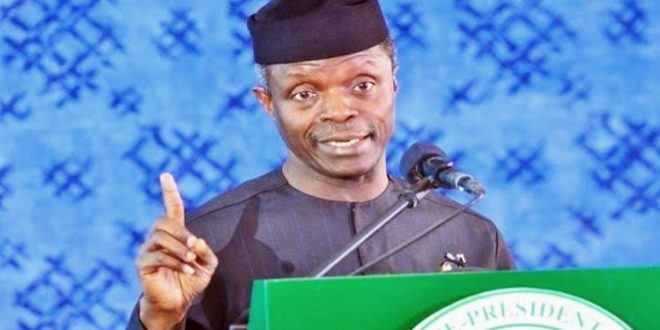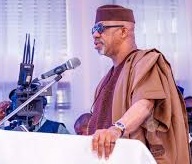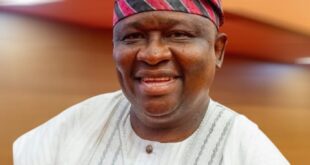By AbuSatar Hamed
In order to increase their Internal Generated Revenue (IGR), States must explore ways to boost its agricultural development and harness the entrepreneurial spirit of Nigerians, according to Vice President Yemi Osinbajo (SAN).
According to a release signed and made available to StarTrend Int’l magazine & www.star trendinternational.com by Laolu Akande, Senior Special Assistant to the President on Media & Publicity, Office of the Vice President, Osinbajo also urged States to “engage in careful and well-thought out strategic planning in order to articulate and implement priorities derived from strategic thinking and based on comparative advantages.
Prof. Osinbajo stated this on Friday October 11, 2019 while delivering the keynote address at the 18th Meeting of the Joint Planning Board (JPB) and National Council on Development Planning (NCDP), in Asaba, Delta State capital.
Speaking at the event, themed “State Fiscal Sustainability and Economic Diversification in Nigeria,” the Vice President stated that it reflected the common commitment of the Federal and State Governments to work together in planning the economic future of our Nation and its people.
Prof. Osinbajo said the diversification of the country’s economy from oil dependence by the Buhari administration’s was aimed at ensuring infrastructural and human capital development.
“Our ultimate purpose is to create jobs and growth and as key economic managers in the context of Nigeria’s fiscal federalism, it is essential that we work collaboratively and in tandem. I am optimistic that the deliberations of this Council will contribute to achieving these noble objectives, which will lead us closer to lifting the 100 million people that the President (Muhammadu Buhari) has promised that we will lift out of poverty in the next 10 years,” he said.
Making references to numerous interventions by the Federal Government to assist States – in payments of workers’ salaries and pensions, restructuring of commercial debts owed by States, to advancing credit from the Central Bank and the Excess Crude Account, the Vice President urged states to improve on the management of their limited resources, especially with the expected long-term decline in oil prices.
He said, “I propose three things for the consideration of this august body as a means of increasing production and generating the revenues at State level. First, I would urge that States engage in careful and well- thought out strategic planning in order to articulate and implement priorities derived from strategic thinking and based on comparative advantages.
“Second there is great scope for boosting agricultural production if States choose two to three high value crops/products to specialize in. Such specialization will enable economies of scale in the provision of support across the entire value chain of prepared land, seeds, fertilizers and pesticides, storage, processing and transportation, marketing and sales. This also implies organizing the agro-allied value chain from farm to table.
“In a similar vein, States must take advantage of the entrepreneurial spirit of Nigerians by empowering economic clusters and trade groups through the provision of basic infrastructure and shared facilities.”
The Vice President said the Buhari administration will continue to create an environment for small businesses to thrive, as seen through its MSME clinics nationwide and providing solar power to boost trade activities in economic clusters such as the ones in Ariaria market in Aba, Sabon Gari market in Kano, and Sura market in Lagos.
Besides he noted that, “the current move of the Federal government to provide broadband connectivity for all by 2023 will assist the States productive base but they cannot charge fees for laying of broadband infrastructure, which is like strangling the goose that will lay the golden eggs.”
State can contribute to creating an environment for small businesses to thrive if it looks into the issues of multiple taxation and levies.
He said, “The complaint of many small businesses is the multiplicity of levies and charges by state and local government agencies. States should in fact invest in agencies that can help small businesses comply with regulations and standards and to access credit. When the businesses grow and employ more they create taxable profit and taxable employees.
“The key thing is to think out of the box and utilize the opportunities that are open to the State. Some would have advantages that can be readily used in the area of tourism, others would be contiguous to major economic centres like Lagos and Abuja which offer markets as well as cheaper and more affordable land for residential and industrial purposes.”
Continuing, Prof. Osinbajo said “to start with, there should be greater collaboration with the Federal Inland Revenue Service to share data and also ensure remittance of VAT proceeds to it.
“Improving tax morale is also a very big part of the story as the evidence shows that people do not feel obliged to pay taxes and they justify this belief by asserting that they do not receive commensurate services.
“It would also be necessary for States to improve tax administration and widen the tax net by making it easier for people to pay tax both in terms of easier processes and lower levels of taxation.”
In the same vein, the Vice President urged States to take advantage of Federal Government programmes, as well as support from development partners to complement their efforts and ease some of their constraints.
“Some examples include the resources and support available from the Universal Basic Education programme, the National Social Investment Programme, the National Livestock Transformation Programme, the Anchor Borrowers Programme, the Family Homes Fund and the Basic Health Care Provision Fund amongst others. Moreover, where support is coming from development partners it should also be leveraged to support fiscal sustainability at State level,” he said.
The Vice President added that States should build skills needed to attract foreign and domestic investments, stating that, “STEM education, functional digital literacy education from early childhood are the crucial building blocks for reaping the fruits of the Knowledge Economy that is now upon us.”
 Startrend International Magazine For Your Latest News And Entertainment Gists
Startrend International Magazine For Your Latest News And Entertainment Gists





